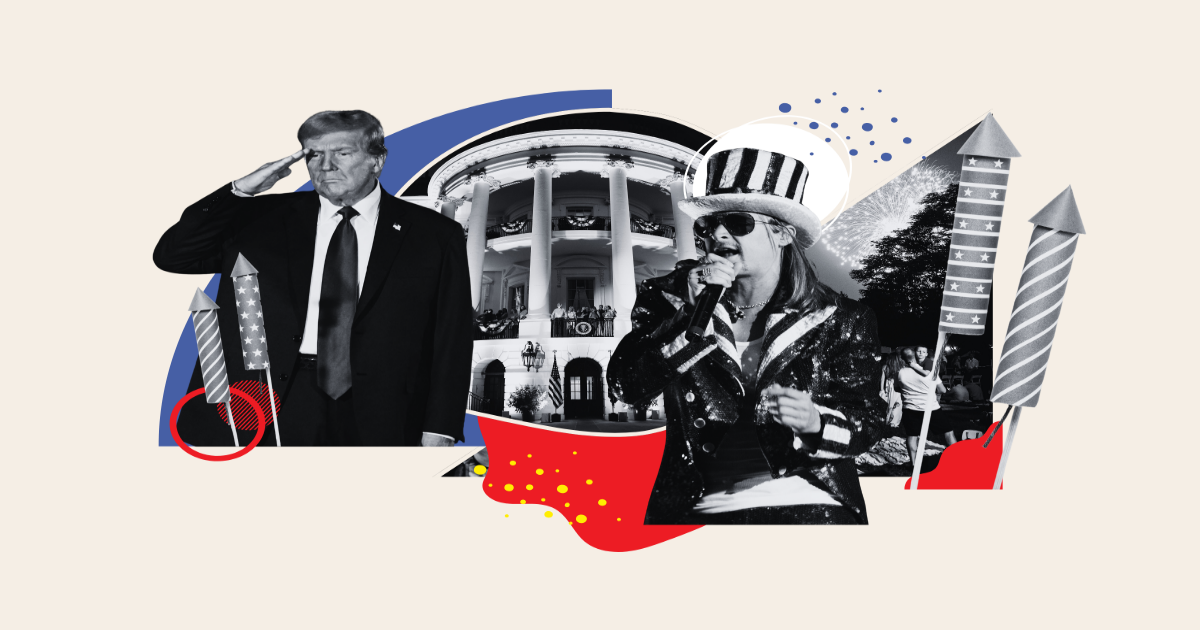On Friday, the United States celebrates the 249th anniversary of the signing of the Declaration of Independence.
Is America living up to its founding ideals? Is the U.S. a force for good in the world today? And how should Americans express their patriotism this Fourth of July? Newsweek contributors Steve Cortes and Faisal Kutty debate:
Steve Cortes:
Since our founding, America has battled tirelessly to live up to the lofty ideals of our revolution and formation. Despite facing setbacks and blemishes, just like any other human institution, the country’s inexorable trajectory has been a march upward toward justice, sovereignty, prosperity, and equality under law. America stands as the pinnacle and leader of Western civilization. President Donald Trump makes this position clear through foreign policy that is restrained, but fierce when required. Previously reticent European allies now lavishly praise Trump and, at his prompting, are stepping up materially to defend the NATO alliance.
Faisal Kutty:
The founding of America—rooted in liberty, justice, and equality—remains one of history’s most inspiring achievements. At its best, America upheld those ideals, using diplomacy and humanitarian aid to save lives, build institutions, and improve the world. Its flaws were tempered by its promise. Today, that legacy is faltering. The U.S. shields regimes that violate human rights and abuses immigration law to silence dissent. From Gaza to university campuses, its power protects the powerful, not the principled. To truly be a force for good again and maintain global respect, America must reclaim its founding values—for everyone, not just its allies.
Cortes:
America quite literally saved the world three times in the 20th century: in two world wars, and then in the Cold War. We asked for nothing in return and then generously funded the very peace we achieved. Now, we rightly turn our focus toward addressing threats at home, such as a border left open for decades and Marxists dominating our institutions, from higher education to taxpayer-funded NGOs.
Kutty:
Yes, America played a vital role in shaping the 20th century—but claiming it “saved the world” alone erases allies’ sacrifices and overlooks its strategic self-interest. U.S. aid came with conditions, as it often should. As for America’s domestic issues, talk of “Marxists” and “open borders” only distorts reality and stokes fear. Patriotism shouldn’t rest on fear or historical amnesia.

Photo-illustration by Newsweek/Getty/Canva
Cortes:
America’s ongoing rebirth rebuffs the globalist detractors and lawless nihilists who tear down statues, riot, and promote uncontrolled migration. True patriotism exalts citizenship—it creates a deep, abiding love of our countrymen, culture, shared ideals, glorious history, and our blessed sovereign land.
Kutty:
On the contrary, true patriotism confronts hard truths—it doesn’t hide behind myths. America was built by lawful dissenters fighting for liberty and justice. An American rebirth demands reckoning, not whitewash. Loving your country means defending the Constitution, not scapegoating. Citizenship is duty, not blind loyalty. Cultural strength lies in its ability to withstand critique, not suppress it.
Cortes:
I agree wholeheartedly! Proud citizens of America must live in reality and speak the truth—for example, the truth that men and women are two distinct sexes. Or that America’s founding principles are honorable and created a superpower that leads the world. Or that trespassers into our land are not “newcomers” or “undocumented,” they are here illegally and must be expelled. We are reclaiming our legacy—and our greatness, just as America enters its 250th year as the greatest nation ever to exist.
Kutty:
I agree there are two major genders—but let’s be honest: this isn’t about biology, which isn’t binary. It’s a dog whistle to exclude. America’s founding ideals were powerful, but they coexisted with slavery, genocide, and exclusion. True patriotism strives to fulfill those ideals, not mythologize them. People crossing borders aren’t “trespassers”—they’re human beings, often fleeing crises fueled by U.S. foreign policy or economic dominance. Due process applies to everyone, including them. Greatness comes not from erasing history, but from confronting it—courageously and inclusively.
Cortes:
The United States is a unique country in world history, founded upon ideals and values explained so eloquently by our nation’s Founding Fathers. But we are more than just an idea. We are a people with a culture and a land, both of which need to be protected, whatever the costs. Indeed, we are the inheritors of greatness forged by strong patriots who tamed a continent, built an economic juggernaut, and saved the world from the tyrannies of fascism and communism. The rise of globalism and talk of “universality” sends segments of the nation into an identity crisis, but we thankfully are finding renewal in a patriotic, populist nationalism that lights a path forward to even more greatness for this republic, into a fantastic 250th year.
Kutty:
America’s founding ideals—liberty, equality, justice—remain among the most powerful ever articulated. The U.S. has done immense good through diplomacy, aid, and global leadership. But when dissent is punished, migrants dehumanized, and international law selectively applied, it projects not principled leadership but selective power. Patriotism should inspire honest reckoning, not denial. True greatness lies in applying justice universally—not just to citizens or allies. The world is watching. Preaching ideals while violating them reveals not moral leadership, but hypocrisy—and it breeds resentment. If America hopes to lead not just militarily, but morally, it must reclaim the values that once made it a beacon to others. Power impresses, but principle inspires.
Steve Cortes was former senior advisor to President Trump and JD Vance, former commentator for Fox News and CNN, and president of the League of American Workers, a populist right pro-laborer advocacy group.
Faisal Kutty is a Toronto-based lawyer, law professor, and frequent contributor to The Toronto Star.
The views expressed in this article are the writers’ own.
